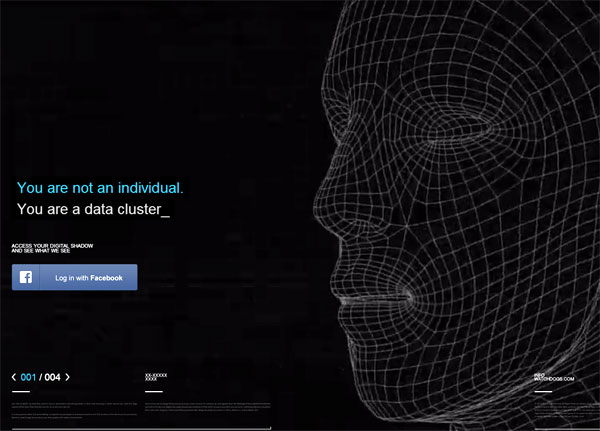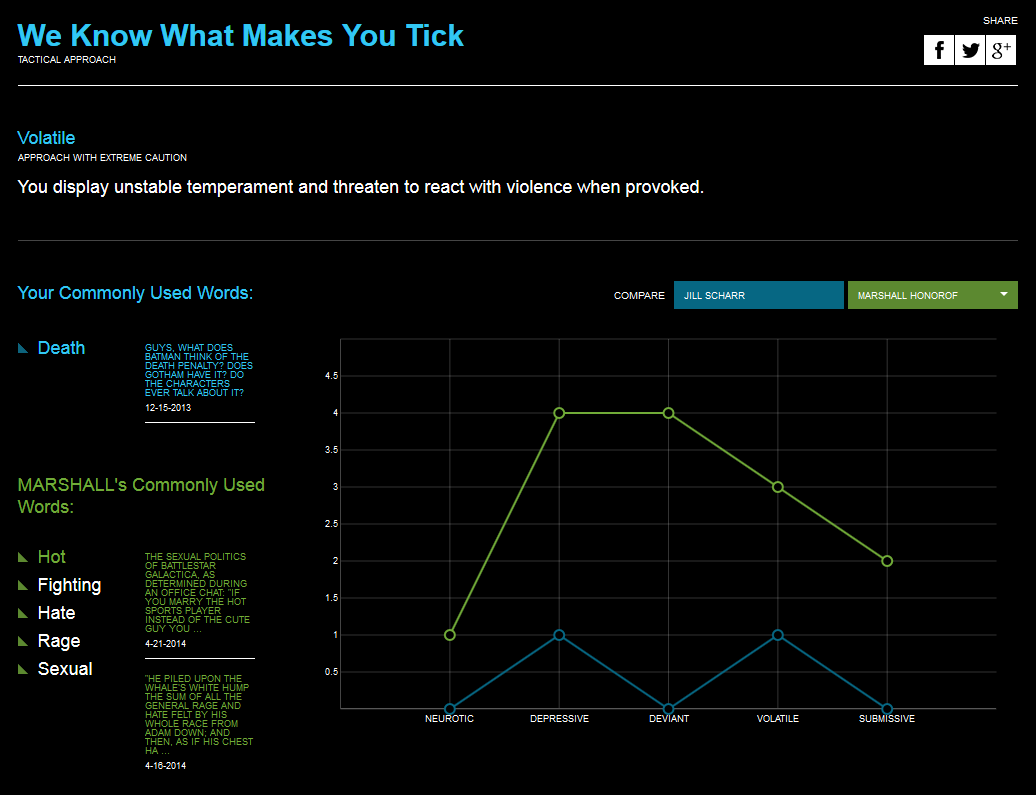Watch Dogs' Digital Shadow Learns Your Facebook Secrets
They know everything about you! Digital Shadow, a promotion for the game 'Watch Dogs,' scrapes your Facebook profile for personal data.


Where do you live? Whom do you talk to? Who do you stalk, and who stalks you? The "Watch Dogs" know — or at least they want you to think they do. "Digital Shadow" is a website, and accompanying Facebook app, that analyzes your Facebook posts and pictures, then presents that information as part of a promotion for the upcoming video game "Watch Dogs."
Set to be released May 27 on PlayStation 3 and 4, Xbox 360 and One, and PC for $59.99 (Wii U release date coming later), "Watch Dogs" is an action/adventure game in which players take the role of a rogue hacker who exploits the social networks, databases and surveillance equipment around him to achieve his own goals.
MORE: Most-Anticipated Games of 2014
Digital Shadow is a fun, if slightly creepy, promotional site that uses your own Facebook information to reiterate "Watch Dogs'" themes of surveillance and privacy. The app claims to "know" deeply personal information about you, but in truth, users need to give the site permission to access their Facebook accounts by going to its promotional website.
If you give it permission, Digital Shadow will then present you with a "dossier" on yourself. It shows you whom you interact with most on Facebook, calling these people "Pawns" who "can be used against you." It also shows you your "obsessions" (people that you interact with who don't often respond) and your "stalkers" (people who interact with you to whom you don't often respond).
These results are drawn from your entire Facebook history and don't appear to be weighted toward your most recent activity, however. If Digital Shadow says you're "obsessed" with your college ex, don't take it personally. It's just calculating the total number of interactions ever, not recent interactions.
Digital Shadow also tries to guess your income and monetary value based on your job. It attempts to trace your location, whether or not you have one listed on Facebook. It generates a list of your most likely passwords based on your name and your closest friends' names.
Sign up to get the BEST of Tom's Guide direct to your inbox.
Get instant access to breaking news, the hottest reviews, great deals and helpful tips.
Perhaps most significantly, Digital Shadow places a monetary value on the data you share online, assessing what your displayed information would be worth to marketers and advertisers. People with higher "digital shadow values" expose more of themselves to the wider world, so don't be dismayed if you're valued "less" than others.
In addition to all this, Digital Shadow shows you "commonly used words" in your Facebook posts and performs sentiment analysis on them, using the frequency of these words to assess whether you are neurotic, depressive, deviant, volatile or submissive.
However, it appears this feature only looks for use of specific charged words such as "need," "smash," and "pain" instead of actually showing you the words you use most frequently. For example, while most users are shown their top 5 commonly used words, we only had one: "death." But given the frequency with which we talk about "Batman," we assume Digital Shadow is only looking for certain words.

Digital Shadow is only a promotion for an upcoming video game, but it's also a pretty interesting, if dramatized, way to look at the raw data on your Facebook profile and see the kinds of conclusions someone might draw from it — or use against you.
Email jscharr@techmedianetwork.com or follow her @JillScharr and Google+. Follow us @TomsGuide, on Facebook and on Google+.
Jill Scharr is a creative writer and narrative designer in the videogame industry. She's currently Project Lead Writer at the games studio Harebrained Schemes, and has also worked at Bungie. Prior to that she worked as a Staff Writer for Tom's Guide, covering video games, online security, 3D printing and tech innovation among many subjects.
-
bmwman91 Interesting stuff. I think that many people might be surprised about what their "online signature" actually looks like when aggregated and posted by a third party. I deleted my various social media accounts a number of years ago, partially because I realized that it is NOT a game, and privacy is a good thing that is easily lost and difficult (or impossible) to get back once compromised. Aside from that, Facebook started trying to monetize the site in earnest and it became rapidly apparent that I, the user, was the product. Obviously I still engage in some amount of online "socializing" since I am posting here and elsewhere, but it generally does not include PII (personally identifiable information).Reply
Anyway, I may be a bit overkill with my privacy angle, and there's nothing wrong with using stuff like Facebook to keep in touch with distant relatives and such. Just be careful how much PII and behavior indicators you put out there because you might not realize how it will look to someone that does not "actually" know you IRL. Digital Shadow might be an interesting wake-up call for some people, and despite being a marketing gag, I can see it having potentially positive effects.
